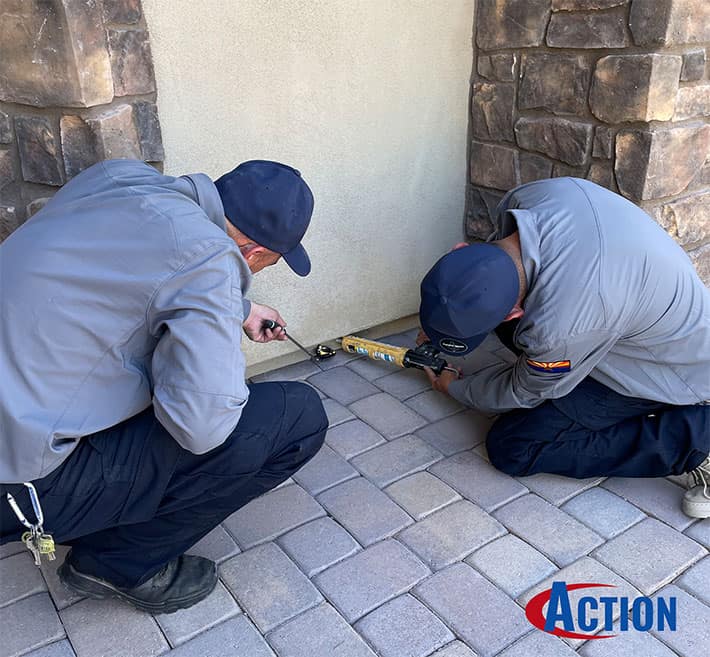Termites (order Isoptera) are insects that feed on cellulose found in wood and plant materials. While not closely related to ants, they form the sister group of wood-eating cockroaches known as mantids.
Termites can wreak devastating destruction on homes. But with proper treatment and an extensive inspection, you can help avoid an infestation.
Signs of Termite Infestation
Termites can be sneaky, making detection difficult. Pests like mice, cockroaches and spiders will invade and leave webs in corners of rooms; however, termites go undetected for years until they cause major destruction to your home.
Fortunately, there are warning signs you can look out for that will help detect an infestation of these destructive insects. The first indicator to watch out for is a swarm of winged termites flying around your windows and foundation.
Once you become aware of a problem, it is critical to contact a professional pest control expert immediately. Doing so will protect both your home and family from termite damage, potentially saving thousands in property loss costs.
Another way to determine if you have termites is by listening closely for the clicking sounds soldiers make when disturbed. They’re defending their colony and signaling danger.
Soldier termites often bang their heads against wood or shake their bodies to attract attention. These noises may be accompanied by a hollow sound.
Signs that your home might have termites include the sagging and blistering of floors, cracks in internal walls or damaged ceilings. These symptoms occur because termites feed on cellulose – the material responsible for floors, walls and ceilings – due to their feeding on it.
On occasion, you may spot tiny holes drilled into your house’s wood as termites exit their nests to form new colonies. These are known as termite exit holes and typically measure no larger than 1/8 of an inch in diameter.
As the swarmers leave the nest, they release a paste made of frass that is used to plug any termite exit holes.
You might notice termite droppings on surfaces such as baseboards, inside your doors or windows or around your foundation. This is often indicative of subterranean termite infestations which are more prevalent in America than drywood termite species.
One of the most noticeable signs of termites on exterior walls is mud tubes. These tunnels serve as their main way of travel and provide them with moisture and food, usually running along side of your home’s foundation.
Termite Prevention
Termites can be a sneaky pest, often living on your property long before you notice any signs of an infestation. That is why it’s critical to have your home inspected by an expert every few years or even before you purchase it.
Eliminate all sources of food and shelter in your home to eliminate termite problems. This involves decluttering, throwing away old magazines, newspapers, cardboard boxes and any other objects that provide warm, dark places for these pests to thrive.
Exterminating any wood from your yard or garage that could attract termites is also recommended. This includes any wood in contact with the ground, such as siding, window frames, retaining walls or fences.
If wood is necessary in areas that may be moist, treat it with termiticides prior to construction. Doing this will prevent termites from colonizing and creating mud tubes to access your home’s interior.
Sealing cracks around water and gas lines is another effective method for keeping termites out. Caulk, foam sealant, or stainless steel mesh may be used in larger gaps for extra protection.
Another way to protect against termites is keeping your roof and gutters clean. Leaves and other debris can accumulate, creating an ideal breeding ground for these pests when left damp.
Finally, ensure all sprinkler heads and downspouts are directed away from your foundation wall to reduce moisture that could attract termites. If you have basements or other dark spaces in your home, regularly inspect these areas for leaks or any moisture issues which might attract termites.
Additionally, avoid storing wood in the crawl space of your home. If you must stack it there, ensure it is several feet off the ground and divert any downspouts away from your house.
If you decide to construct a new structure, make sure it is constructed with materials which are repellent to termites such as pressure-treated lumber or naturally resistant building materials such as concrete and metal. Furthermore, pretreating any soil where your home’s foundation will sit with a termiticide prior to beginning construction can help ensure its success.
Termite Treatment
Termites are an often-found pest that can do serious damage to your home. These tiny, sneaky creatures live and work inside of homes for months before you even notice them.
Thankfully, there are several methods available to treat termite infestations. These include termiticide, soil treatments, direct chemicals and fumigation; depending on how severe your issue is you may choose one of these treatments or all three.
Subterranean termite soil treatments can help eliminate existing colonies and minimize the likelihood that new ones will emerge in the future. They involve digging a trench around your home’s exterior and injecting liquid termiticide into the soil, protecting it from termites for an average duration of five years.
These techniques are mainly employed to eliminate termites that have already made their way into your home, though they can also prevent them from entering in the first place. This type of treatment necessitates knowledge of building construction as well as specialized equipment.
Termidor Foam is an effective termite control method that uses odorless foam to poison them. It’s sprayed directly into cracks, voids and crevices where termites often hide out.
In certain instances, this method may be more cost-effective than soil treatments. It’s especially beneficial in areas with high humidity levels, like Texas.
Direct chemical termite control is not a permanent solution and should only be employed when an infestation is severe or ongoing. Furthermore, you’ll need regular inspections in order to keep your termite problem under control.
A professional termite exterminator can assist you in selecting the most effective course of action for your specific case. There are various treatments available, and an experienced pest control company will be able to suggest which one is most effective at keeping your home free from termites.
If you believe there may be a termite infestation on your property, contact an experienced pest control company immediately. Most reliable companies will offer to come out and inspect your property at no charge.
It is essential to remember that termite treatment is an ongoing process and it may take up to 4 weeks for them to swarm after a treatment. While this could indicate ineffectiveness of the treatment, it could also indicate colony expansion and require more intensive measures.
Termite Inspection
If you are selling or purchasing a home, it is imperative to get a termite inspection performed. Doing so can help avoid expensive damage and the loss of your property’s value. Depending on the state, this may also be required by your lender. Especially when it’s known that Termites are in Arizona and can damage real estate and homes.
During a termite inspection, the inspector will thoroughly check all wood in your home – floors, ceilings, walls, windows and door frames – using a special sounding tool to probe suspicious areas for signs of activity. Any slightly raised points will indicate termite activity.
The inspector will also check your eaves and gutters for termite signs, as well as inspect your roof for damage or leaks.
A termite inspector will begin by inspecting the perimeter of your home as close to its foundation as possible. They’ll look for mud tubes, which termites construct as a way of connecting their nests to wood sources for food.
They will also look for signs of termites, such as sagging or warped wood around baseboards. A weakened baseboard could indicate that termites have eaten through the wood and caused serious damage.
Your inspector will also examine the bottom of cabinets and along the sidewalls for signs of termite damage. Termites require moisture to survive, which can often be achieved through leaky faucets.
When termite damage is discovered, your inspector can suggest ways to remedy the situation. Possible fixes may include installing a moisture barrier, replacing damaged siding or replastering.
Other recommended repairs include fixing leaking plumbing, installing a hose bib and clearing away any dead trees, shrubs or vegetation that might provide entry points for termites. Doing this will keep your home secure and enable you to sell it quickly if needed.
You can make your home more inviting to a termite inspector by clearing away clutter and organizing the interior of your residence. Try moving any items that might obstruct their view or access, such as furniture and storage items.
Cluttered homes can make inspections more challenging for an inspector, so to make the process go more smoothly you may want to rearrange furniture and other belongings before your scheduled inspection date. For instance, taking out unused appliances from the kitchen and garage beforehand can make things go smoother during inspection time.
If you need a termite inspection in Phoenix, a termite inspection in Scottsdale, a termite inspection in Gilbert AZ or surrounding area contact ACTION Termite & Pest Control.










